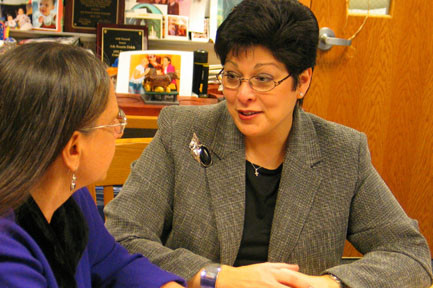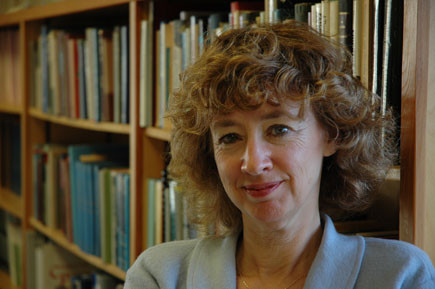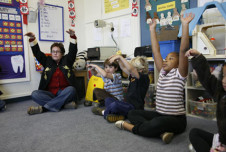When hijackers crashed airplanes into the towers of the World Trade Center on September 11, 2001, Ada Rosario Dolch was at work nearby. Principal of the High School for Leadership and Public Service in New York, a school two blocks south of Ground Zero, Dolch guided her staff and students to safety amidst panic, chaos, and the knowledge that her sister was at work in Tower One.
I knew my sister was in that building, but my first duty was to my school children,” said Dolch. She prayed for her sister’s safety as she tried to calm her frightened students. After the towers fell and the smoke cleared, Dolch’s pupils were free from danger, but she had lost her sister.
 Linda Lantieri (left), the founder of Project Renewal, with high school principal Ada Rosario Dolch.
© Pam Hasegawa
Linda Lantieri (left), the founder of Project Renewal, with high school principal Ada Rosario Dolch.
© Pam Hasegawa
Following the attacks, Dolch and many other New York educators had to double as crisis counselors at their schools. They provided much needed support to their students for weeks or even months on end, but they often failed to care for themselves and attend to their own recovery. Dolch said her responsibilities to her students, staff, and family required more emotional strength than she thought she could muster. “I was burning deep inside,” she said. But before she burned out, Dolch found Project Renewal.
Project Renewal was launched in the spring of 2002 by Linda Lantieri, the founding director of one of the nation’s largest school-based conflict resolution programs, the Resolving Conflict Creatively Program. Lantieri had visited many schools after September 11 and said she saw teachers fading away under intense stress, with little support “to physically, mentally, and emotionally replenish themselves.” Through Project Renewal, she wanted to help educators “learn how to develop their own inner resources for resilience” so that they could care for themselves even as they empathized with other people’s pain. The program received a seed grant from the September 11th Fund, and 20 New York City educators enrolled, including Ada Dolch.
To help connect participants with their “inner resources for resilience,” Project Renewal offers them day-long and seasonal resi¬dential retreats, yoga classes, and individual stress reduction sessions from certified bodywork practitioners. At the retreats, participants learn soothing breathing exercises, techniques for relaxing their muscles, and basic meditation practices.
Project Renewal is not alone in its approach. Psychologist Margaret Kemeny and other researchers at the University of California, San Francisco, have piloted a program that tests whether Eastern philosophy and meditation can bolster teachers’ capacities for empathy and compassion. That program, called Cultivating Emotional Balance, aims to help teachers handle the everyday emotional demands of their job, not only a large-scale tragedy like September 11.
These programs’ methods might seem more suitable to a New Age spa than a New York City classroom, but they are grounded in recent scientific research on the physical and mental benefits of meditation and similar stress-reduction techniques. This research has suggested that people who deal with a lot of stress—including but not limited to teachers—can develop skills and practices to rein in their anxieties and cultivate positive emotions.
Two pioneering scientists in this field are Richard Davidson and Jon Kabat-Zinn. In 1997, Davidson, director of the Laboratory for Affective Neuroscience at the University of Wisconsin, Madison, tested the effects of “mindfulness meditation” on employees of a biotechnology company. That form of meditation is meant to make practitioners more aware of their external surroundings and internal emotions.
 Margaret Kemeny, the principal investigator on the Cultivating Emotional Balance research project.
© Jason Marsh
Margaret Kemeny, the principal investigator on the Cultivating Emotional Balance research project.
© Jason Marsh
Davidson divided participants into two groups. Twenty-five subjects in the experimental group were given training in mindfulness meditation from Kabat-Zinn, who founded a mindfulness-based stress reduction program when he was on the faculty of the University of Massachusetts Medical Center. Over two months, this group attended a weekly meditation class and one seven-hour retreat. They were also told to practice their meditation at home for an hour a day, six days a week. The 16 members of the control group did not receive meditation training until after the study was completed.
For both groups, the Madison researchers measured electrical activity in the prefrontal cortex, the frontal part of the brain that is associated with specific kinds of emotion. Research had already shown that the left side of this region becomes more active during periods of positive emotion while the right prefrontal cortex is associated with emotional distress. Davidson’s results showed increased activity in the left side of the frontal region among members of the meditation group; these people also went from saying they were highly stressed to reporting that they felt more excited by their work. Altogether, the results suggested a link between meditation and both reduced anxiety and heightened positive emotions.
“Practices such as mindfulness meditation are tools to actively and voluntarily control our emotions through mental training,” said Davidson. “They are potentially useful for a large number of occupations and individuals, in that they can decrease stress reactivity and increase positive emotions in different kinds of people.”
Preliminary results from the Cultivating Emotional Balance program corroborate Davidson’s findings. The program’s pilot study involved 15 secondary school teachers in a five-week training session, where they learned Buddhist mindfulness techniques as well as skills developed by Western psychology for understanding their own and others’ emotions. According to Kemeny, the principal investigator, the results showed that a heightened emotional awareness also encouraged a heightened sense of self. After the training, participants showed an increase in affection for others and a decrease in their negative reactions to stress.
“Often people’s negative reactions stem from a negative sense of self,” said Kemeny. “In the pilot study, as people developed a sense of self, they became less vulnerable to outside factors.”
Teachers were the right subjects for the study, she added, because of “the emotional demands and stressful nature of their jobs.” Indeed, much of the feedback from participants showed how the Cultivating Emotional Balance program helped them manage their stress. One teacher wrote that the meditation techniques she’d learned had given her a “deeper sense of relaxation than [she’d] ever felt before.” Another teacher described how the program had helped her to empathize with a difficult student. “I probably would have taken it personally before and felt angry with the kid,” she wrote. “But that’s not what it was about. It had nothing to do with me. It was about his internal trauma.”
The response to Project Renewal was similarly enthusiastic. Dolch, for one, said the program helped her “heal from within and restock my emotional reserves.” After working with teachers in the wake of September 11, Lantieri said she recognized an ongoing need for Project Renewal. She decided to expand the program so that it could help prepare educators to care for themselves and serve their students before a time of crisis, not just in response to one. Project Renewal has now become a project of the Tides Center and continues to offer retreats and trainings for teachers in 56 New York City schools. So far, the program has involved more than 3,000 educators, who collec¬tively serve over 70,000 students.
A clinical trial of Cultivating Emotional Balance is scheduled to begin in January 2005. As in the pilot study, the seven-part curriculum will train participants in skills such as meditation, recognizing emotions communicated by other people’s facial expressions, and strategies to counteract negative emotions. Kemeny and her colleagues have already begun to recruit female school teachers (between the ages of 25 and 60) who live in the San Francisco Bay Area and are in a relationship with an intimate partner.
Ada Dolch said these programs and research efforts are satisfying a substantial need, and she only hopes more teachers learn about them. These days, she looks back with fondness on her own Project Renewal retreat after September 11. “Each participant left with a pocketful of goodies—great tools that they could lay their hands on in times of crisis and carry on their good work.”





Comments